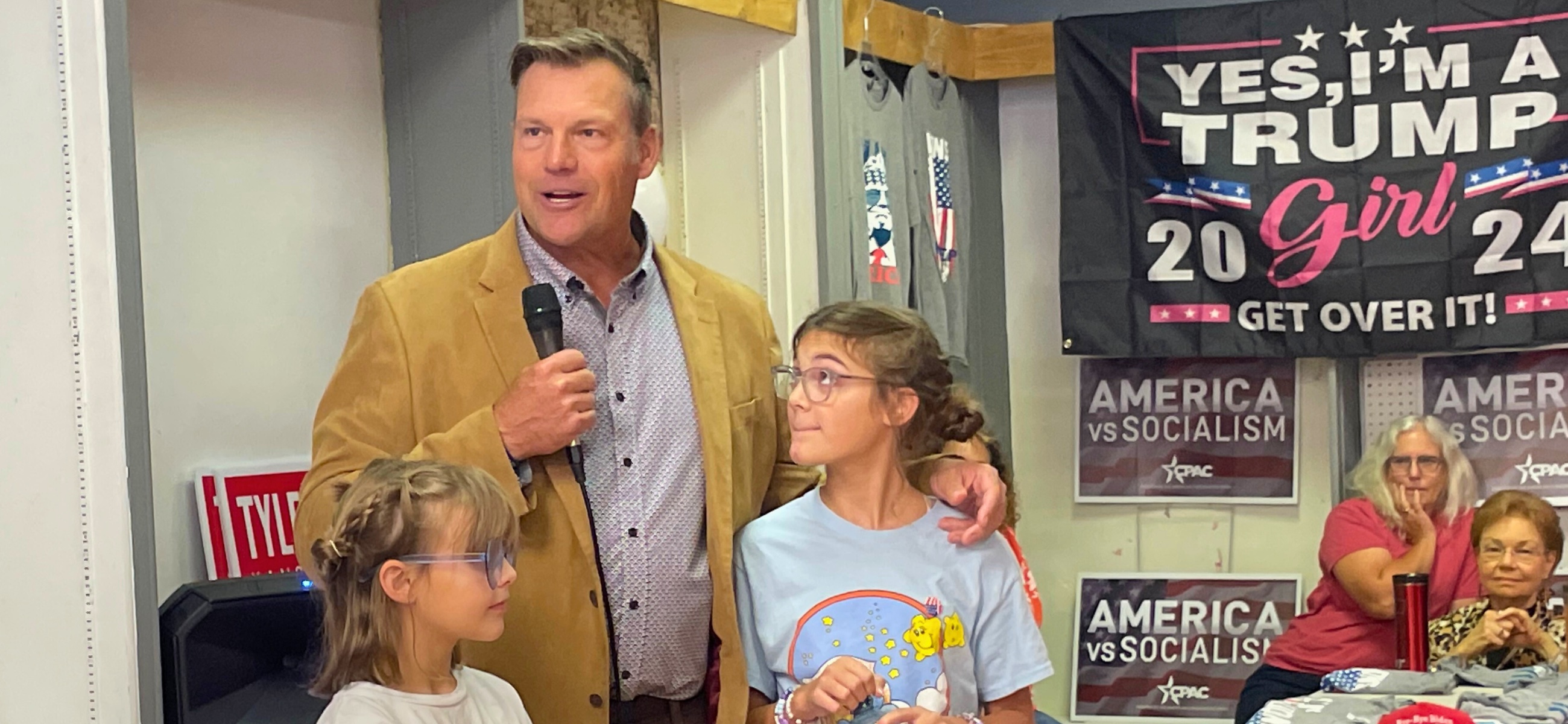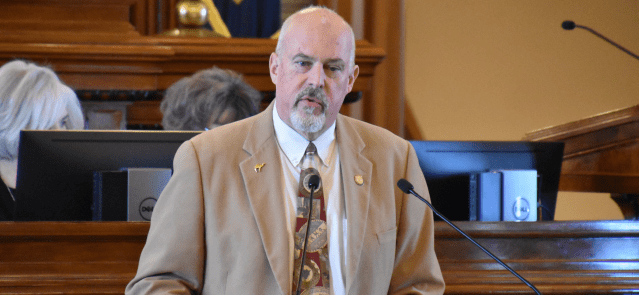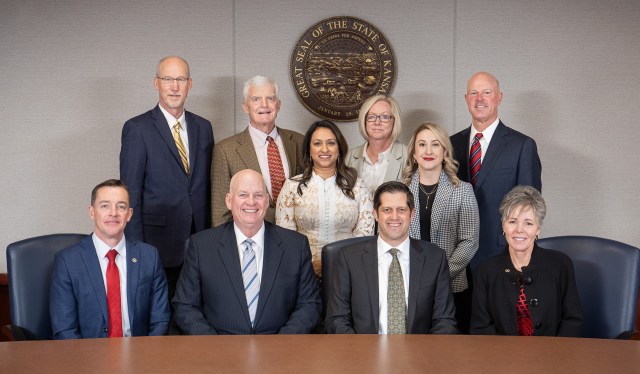Stay ahead of the curve as a political insider with deep policy analysis, daily briefings and policy-shaping tools.
Request a Demo
Kansas Attorney General Kris Kobach, pictured with his daughters, delivers a speech Sept. 6, 2024, to christen the opening of the Shawnee County Republican Party's temporary headquarters in downtown Topeka. (Credit: Matt Resnick)
- Attorney General Kobach calls state’s Supreme Court most “progressive” in nation
- Kobach says “hostile” and “progressive” court is a result of flawed selection process
- Kobach calls for constitutional amendment to overhaul judicial selection
Attorney General Kris Kobach on Friday publicly accused Kansas Supreme Court justices of exerting hostility from the bench while also calling for reform of the state’s judicial selection process.
“Two words are dominating my thoughts about the upcoming election and [they’re] not ‘Donald Trump,’” Kobach said. “It’s about what we face in the Attorney General’s Office, and that is ‘hostile judges.’”
Kobach’s blistering critique, delivered during a ceremonial opening of the Shawnee County Republican Party’s temporary headquarters in downtown Topeka, centered on the state’s Supreme Court Nominating Commission and his desire for a constitutional amendment that would usher in a new selection process.
Kobach contended that the commission, tasked with recommending the appointments of qualified individuals for the Kansas Supreme Court and the state’s Court of Appeals, is stacked with practicing attorneys that occupy five of the 9 seats — including the committee chair, who is elected by lawyers statewide.
“The majority of the judicial selection commission is voted on by lawyers,” Kobach said, while also asserting that “attorneys are disproportionately on the left end of the political spectrum and it’s reflected in the justices we get.”
Kobach said the nominating process has led to the “most progressive” state supreme court in the nation. But the only way potential reform can happen, he said, is if Republicans either maintain or build upon their supermajorities in the House and Senate so that it can wield a veto-proof majority.
“We absolutely have to have a constitutional amendment to change that [process],” Kobach said. “And the only way that is possible is if certain senators and House of Representative candidates in the state Legislature get across the line.”
Under Kansas’ “merit-based” judicial selection process, the nominating commission vets candidates and forwards its recommendations to the governor for consideration. Kobach also said the Legislature was considering introducing a constitutional amendment last session, but House leadership determined they were a vote or two shy of passage.
“But they thought they had the votes in the Senate,” he said.
In 2022, Senate President Ty Masterson, R-Andover, proposed amendments that would have altered the decades-old selection process — one of which would have placed Supreme Court judges on the statewide ballot. Prior to that, Masterson pursued another alternative plan that entailed a Senate confirmation process. Those measures encountered turbulence and the merit-based process marched on.
At the conclusion of Monday’s Legislative Coordinating Council meeting, both Masterson and House Speaker Dan Hawkins, R-Wichita, said they’ve not had any discussion with Kobach pertaining to the introduction of a constitutional amendment during the 2025 session if the GOP maintains its tight grip on both chambers. But Masterson did indicate he might be open to the possibility “if the climate is right.”
“I’ve been considering it my entire career, because we have the least democratic way of selecting [judges],”Masterson said.
Hawkins added, “The last time we had that vote — which has not been that many years ago — we came up significantly short.”
“This is the Attorney General giving his talk,” Hawkins said. “He’s not talking for us.”
Senate Minority Leader Dinah Sykes, D-Lenexa, said she is opposed to reform of the selection process, pointing to the so-called “triple play scandal” that rocked the state government in 1956. The sequence of events unfolded with incumbent Gov. Fred Hall being dispatched in his reelection bid — and then plotting with his lieutenant governor to appoint Hall to a vacant Supreme Court post.
House Minority Leader Vic Miller, D-Topeka, said “it’s easy for Kobach to make those types of statements but very difficult to provide hard evidence” that change is necessary.
“I bet if you pressed him on it, he couldn’t cite that his position was related to anything but abortion,” Miller said.
During Kobach’s remarks on Friday, he cited abortion as an existential issue affecting the lives of many. One recent ruling that rankled Kobach was the Supreme Court’s near unanimous decision to strike down abortion-related restrictions.
Miller said he’s “fine” with the merit-based system, and that placing judges on ballots for a statewide election is a path the state doesn’t want to travel down.
“I think we have highly qualified justices that are a result of the system we have,” he said. “I can’t imagine a scenario where judges are elected, because I don’t think people in those positions should be motivated by what’s popular.”
He also said that he’s OK with lawyers “having a heavy hand” in the review and nomination process.
“Because the attorneys understand the underlying principles that justices in this case are supposed to operate under without fear of political retribution,” he said.
In an interview with State Affairs Friday, Kobach said another reason the judicial selection process is flawed is because it lacks accountability. Since taking office in January 2019, Kelly has appointed three of the Supreme Court’s seven justices — and six of the 14 judges presiding over the Court of Appeals.
“You can’t hold [Gov. Laura Kelly] accountable when she’s given three names and she has to choose three names,” Kobach said. “You can’t blame or credit her for the appointment of a judge because it didn’t come fully from her.”
Kobach also asserted that some of his “victories” have been by narrow margins when he believes the outcome would have been “a slam dunk” if argued in front of other high courts. He pointed to a 4-3 decision in favor of a signature verification law he argued for.
“I was really happy that we won a 4-3 decision, but I think in most other states that would have been a 7-0 decision,” he said. “And so you have these cases on the margin that could go either way. And the tilt of the court makes it very difficult for what should be a very easy win when you’re defending a state law like that.”
He circled back to the topic of abortion.
“Where the leaning of the court is so aggressively to the left — that makes it almost impossible for one side to present its legal argument with any hope of winning,” he said. “So it begs the question, ‘What’s the reason our court has such a leftward tilt?’ — especially given the politics of our state, which has Republican supermajorities. And the only answer is our method of selecting justices.”
The merit-based selection process, Kobach said, doesn’t actually have much merit at all.
“Ironically, it was promoted as a nonpartisan merit-based selection system,” he said. “But what it has done is push the partisanship behind closed doors. So instead of an open debate in the Capitol about a justice, it’s a closed-debate among commission members.
“And in terms of being merit-based, I don’t think there is any evidence that it produces superior merit than the other systems around the country.”
Matt Resnick is a statehouse reporter at State Affairs Pro Kansas/Hawver’s Capitol Report. Reach him at [email protected]
Know the most important news affecting Kansas
Get our free weekly newsletter that covers government, policy and politics that impact your everyday life—in 5 minutes or less.
The opening of the Republican National Convention: A crucial moment for citizens nationwide
As the Republican National Convention kicks off in Milwaukee today, the eyes of the nation turn to a pivotal event that could shape the political landscape for years to come. This year’s convention isn’t just a gathering of party faithful; it’s a crucial moment to engage with the democratic process, understand the policies and platforms …
Rep. Les Mason dies at 69 of brain aneurysm
House Assistant Majority Leader Les Mason died in Wichita at age 69 after suffering a brain aneurysm.
Board of Regents’ Alysia Johnston hits back at accusations of financial mismanagement at Fort Scott
First-term Kansas Board of Regents member Alysia Johnston said questions recently raised about her alleged role in a financial crisis engulfing Fort Scott Community College are false and personally hurtful. Multiple Republican senators told State Affairs Johnston should be held accountable for the school having allegedly exceeded its legally published budget by roughly $700,000 in …
Statehouse Briefs: Summer feeding program to provide $120 for groceries
A new state program will help families buy food for their school-aged children during the summer. The Kansas Department for Children and Families (DCF) on Thursday launched Summer EBT, which will provide $120 in grocery money to eligible families with children 7 to 17 years old. The program, known as SUN Bucks in other states, …




